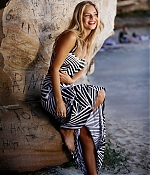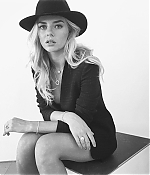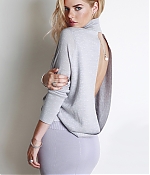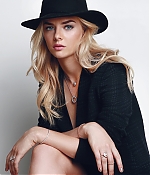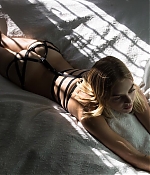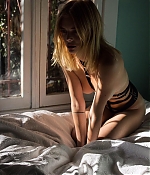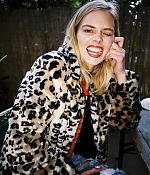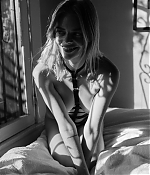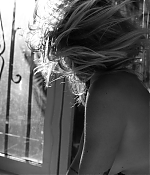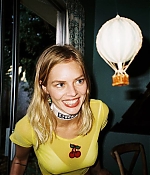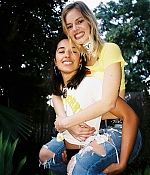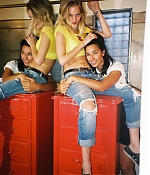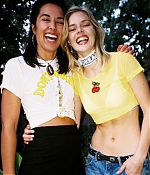Samara Weaving Talks to Patti LuPone About the Dirty Business of Hollywood
Plenty of ink has been spilled about Ryan Murphy’s revisionist fantasy Hollywood. In his version of the studio system’s golden years, women of color are up for Oscars, and actors can come out of the closet with their careers intact. Even the blonde, blue-eyed up-and-comer turns out to be more of an ally than an enemy. Samara Weaving, who plays said ingenue in the Netflix series, has said that Murphy envisioned her character Claire Wood as a spider, attacking when it needs to be seen. But the Australian actor takes what could have been a collage of the ambitious, backstabbing actresses we’ve all seen before, and instead spins that archetype into something surprising. It’s not the first time Weaving has toyed with expectations. She made the most of a small role in the Oscar-nominated Three Billboards Outside Ebbing, Missouri, and last year, came out of nowhere to snatch the scream-queen throne as the extremely watchable lead in the surprise horror hit Ready or Not. Later this year, she’ll lend her charisma to Bill & Ted Face the Music, the long-awaited third chapter of the slacker comedy classic, playing the daughter of Alex Winter’s Ted Logan.
A few days after the release of Hollywood, Weaving, who’s in lockdown in Los Angeles, took a break from not learning how to knit to hop on the phone with the stage legend Patti LuPone, who plays her mother on the show. After comparing quarantine notes, they got down to the business of ranking their favorite classic movie stars, and discussing what life is really like in Hollywood.
———
SAMARA WEAVING: Patti! How are you?
LUPONE: Hi, honey, how are you?
WEAVING: I miss you. How are you doing in the craziness?
LUPONE: I’m finding now it depends on the weather. If it’s a shitty day, then I’m in a shitty mood, and it’s hard to get out of. If it’s a beautiful day, then I feel motivated. I have the option to do something. I don’t necessarily do it, but at least I have the option. We’re lucky because we’re in the country, and it’s beautiful seeing the blossoming of spring. Are you in L.A.?
WEAVING: I’m in L.A. I’m very aware of how privileged I am that I don’t worry about finances or looking after little children like a lot of my friends. So I can really kind of just do whatever I want in the day and don’t really have to worry about it. Some days are a bit of a pain in the ass. Other days, great. It’s kind of nice to just relax and hang out, and I don’t have to feel guilty about it.
LUPONE: What I feel guilty about is the fact that I don’t have any structure. I’m so used to being disciplined, and now that there is no work, I don’t know how to self-motivate.
WEAVING: Same. I need a strict regimen. And now that that that’s all gone, I’m just AWOL.
LUPONE: Have you learned any new skills? I have not learned anything.
WEAVING: No. My sister started learning how to knit. And I thought, “Oh, that’s a cute little thing I could learn how to do.” So I’ve got a little knitting kit that’s sat in the kitchen, and I haven’t even opened it yet. Maybe I’ll do that someday.
LUPONE: What’s the first thing you’re going to do when this is over?
WEAVING: I’m going to hug everybody.
LUPONE: Oh, you sweetheart. I’m with you. When we do these press things on Zoom, I just hug my computer at the end of it. It’s such a special cast, all you guys in Hollywood. There was such a wonderful connection with all of us.
WEAVING: I know. I think that’s quite rare to find.
LUPONE: How is your mind? My mind is mush. I can’t remember anything. I can’t remember people’s names. I don’t know how I’m going to go back to rehearsals for Company. I did the Zoom thing with the graduating class of the University of North Carolina screenwriters, and they had professional screenwriters in there, and they said, “If you’re in a musical, you sing the show every night at 8:00.” And I went, “Holy shit, maybe I should start to do that so I’m not scared out of my mind when I finally go back.” But there’s also that expression, “Don’t leave it in the dressing room.” So I don’t want to leave it in my basement. It’s a weird, weird time.
WEAVING: It’s going to be a new world after this, because there’s going to be some things that work so well in quarantine that will stay, and some things that people are going to really want or miss and need. And I think theater is one of those big ones. I miss it so much.
LUPONE: How realistic do you think the depiction of the Hollywood industry is in the show? The glitz, glamour, exploitation?
WEAVING: I don’t think it’s as bad as it was back then. When I was doing research of that period, it was just a horror story after horror story. But I know for me, it’s that you’re being taken on face value, and you sometimes really have to prove that you have ideas or that you have opinions about the work. Sometimes I’d have to really work and push to be understood that I can bring something to the table, other than just show up and have lines to say.
LUPONE: Do you think that’s because you’re a woman?
WEAVING: I think so. I don’t know. I think the blond hair, blue eyes, and the Australian accent don’t do me any favors when I’m in a room full of older producers who are a little intimidating, and they kind of know it. But I’m getting better at it. Kind of.
LUPONE: I find our business, and I’ve been primarily on a stage, physically dirty. I’m not insulting anybody for not cleaning a studio or a theater, but it’s hard work. And more often than not, our rehearsal rooms are not in the best shape, and the work we put in is hard work. We’re really fortunate that we are creators, but I don’t find it glamorous, and I never found it glamorous.
WEAVING: No. Never.
LUPONE: It’s glamorous maybe once a year when you have to go to a premiere or an opening night. And then that becomes work, because of all the work you put into making yourself glamorous.
WEAVING: It is a real catch-22, isn’t it? They’re like, “Oh, you’re in a movie. Where are you?” It’s like, “I’m in Serbia, and I’m covered in mud and flies, and the trailer’s broken again.” But it’s fun.
LUPONE: It is what it is. And you know what? I suppose in a way you could consider that glamorous. I certainly don’t want to paint a picture of us suffering. We are so lucky to be in the business we’re in, and we’re so lucky to be well taken care of by really conscientious producers and production managers. But it isn’t glamorous, and I don’t think it was ever glamorous for the golden age of moviemaking.
WEAVING: It’s always fun playing in the mud, but there is a super-illusion that it’s glamorous. And you’re right, those events are hard work because you’re dressed to the nines and you’ve got makeup and tons of people.
LUPONE: And you’re sweating in your dress.
WEAVING: Your hair is crinkle-y.
LUPONE: I’m just nervously anxious and looking around. “Hey, ho, the glamorous life.” That Stephen Sondheim song. I think the word “diva” is misused in our business except for opera singers, where it originated. A diva in the opera is the same thing as a prima ballerina in ballet. And we don’t have an equivalent word in the acting profession. I think diva belongs to the opera singer, doing supernatural things with a natural instrument.
WEAVING: I think you’re right. You would know best. Because I only heard it from the Beyoncé song.
LUPONE: Sometimes diva has a bad connotation to it. And I think in the opera world where there are quite grand gestures, that if they pull a diva move, like Maria Callas—she was famously fired from the Met. And when she was singing at La Scala, I believe, they threw turnips at her. We don’t have that in our business. Have you ever had a turnip thrown at you onstage?
WEAVING: Not yet.
LUPONE: Who do you consider the greatest Hollywood star of all time?
WEAVING: I think Ingrid Bergman. I watched a lot of old film. My dad has a PhD in film noir, so we watched a lot of noir films, and I always loved Ingrid Bergman and her physicality. She’s so relaxed and so elegant at the same time with her sort of cheekiness.
LUPONE: And she doesn’t have a bad angle on her face. My hero is Bette Davis. She has been since I was really, really, young. And why? I don’t know. She wasn’t the prettiest woman on camera, but she commanded it. But the greatest diva of all time—for me, it’s Maria Callas. That is the greatest diva: Maria Callas. They don’t make them like that anymore.
WEAVING: They don’t.
LUPONE: I remember when we met, I was sitting in the makeup chair, and this ethereal blonde wafted into the trailer, came directly to me, and said, “Hi, I’m Sam. I play your daughter.” And I looked up at this gorgeous creature, and first, I went, “Oh, my God, she’s so beautiful.”
WEAVING: I remember coming up to you. I was such a fan of you and your work, you were almost an enigma. I saw you in the trailer, and I was like, “Okay, let’s do it. Let’s go up to Miss LuPone.” And I did, and you were so lovely and you were laughing and singing and swearing like a sailor and all the rest. I’m glad we got along. It made it so much easier to be so horrible to you.
LUPONE: We don’t get to meet each other until the day that we’re working with each other. It was a very rare atmosphere that all of us accepted and liked one another right off the bat, so that we could get down to the work. Did you ever not want to be an actor?
WEAVING: No, I don’t think I ever have had that thought, and I don’t remember ever having a light bulb moment, like, “Oh, I want to do that.” It was just always there. And then once I found out I could do it professionally, it was even better. I have a general anxiety disorder, so acting, even in front of my parents, is a way to be extroverted without being judged. When did you decide?
LUPONE: I’ve always known that I belonged on the stage. At four years old, I made this realization. I was tap dancing furiously downstage right, fell in love with the audience, and I never looked back. I knew that what I had was a god-given gift to be given away. And so, I’ve never questioned my talent. It’s not a boast. It’s a god-given gift.
WEAVING: Once you’ve captured and realized that you can do it for a living, you never want to look back.
LUPONE: What’s the most grueling role you ever played?
WEAVING: I think it was this show I did called Picnic at Hanging Rock. It was set in the 1900s in Australia, so we had corsets and petticoats. You couldn’t undress without help, because there was so much stuff going on.
LUPONE: Working in the heat is the most grueling thing.
WEAVING: Yeah. It was wearing corsets and petticoats in the heat, and then we had to climb this beautiful mountain, and it looks gorgeous, but we were sweltering. And then we were in the horse-drawn carriages—we could just not get out of the sun. I think it’s actually those scenes where you’re not really acting in them that are the most grueling. They’re these really wide shots, and they look really beautiful, but mentally, you’re not working. You’re doing it for the beauty of the cinema. It’s long days, and you don’t really have to do much.
LUPONE: I love that movie, and I’m going to watch it again just for your performance. I worked with [the director] Pete Weir on Witness. What a wonderful director.
WEAVING: This is actually the show we did. It came out a couple of years ago. He did the original film in the ’80s, and then we did a six-part miniseries a couple of years ago based on it.
LUPONE: Oh, so then I’m going to have to check that one out. Oh, my God. I was going to say, “How old are you? And when did you start acting?”
WEAVING: Yeah, I wasn’t born when that film came out.
LUPONE: Oh, well, I was sitting here thinking, “Geez, she must be a child actor.”
WEAVING: I was a baby in the corner.


